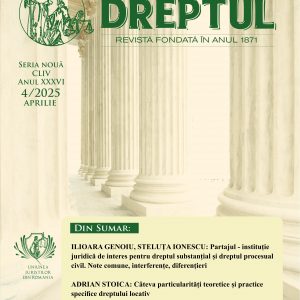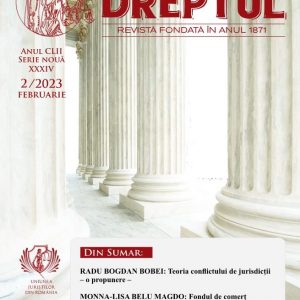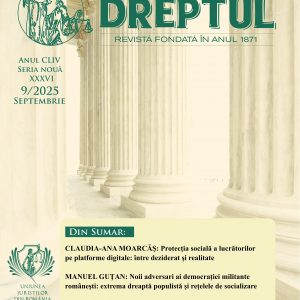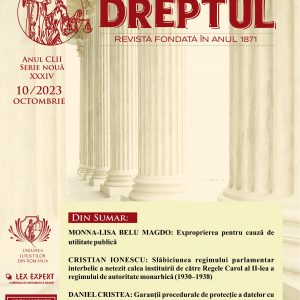-
 Au fost analizate mai multe situaþii în care pedepsele aplicate inculpaþilor trebuiau sã fie descontopite în individualitatea lor pentru fapte concurente ºi apoi aplicarea procedeului judiciar de contopire din nou a acestora cu pedeapsa ce se aplicã în cauza dedusã judecãþii, potrivit dispoziþiilor art. 36 alin. (1) C.pen. Contopirea din nou a pedepselor se referã atât la pedepse integrale aplicate, cât ºi la fracþiunile acestora rãmase neexecutate, ceea ce poate conduce la revocarea ºi contopirea unor resturi de pedeapsã care au mai fost revocate ºi contopite în noua pedeapsã (cu notã criticã).
Au fost analizate mai multe situaþii în care pedepsele aplicate inculpaþilor trebuiau sã fie descontopite în individualitatea lor pentru fapte concurente ºi apoi aplicarea procedeului judiciar de contopire din nou a acestora cu pedeapsa ce se aplicã în cauza dedusã judecãþii, potrivit dispoziþiilor art. 36 alin. (1) C.pen. Contopirea din nou a pedepselor se referã atât la pedepse integrale aplicate, cât ºi la fracþiunile acestora rãmase neexecutate, ceea ce poate conduce la revocarea ºi contopirea unor resturi de pedeapsã care au mai fost revocate ºi contopite în noua pedeapsã (cu notã criticã). -

-

-
 În cazul în care clientul este o persoană juridică atât încheierea contractului de antrepriză, cât și recepția trebuie realizate de organele de administrare ale respectivei persoane juridice, având în vedere că exercitarea capacității de exercițiu se realizează prin intermediul acestor organe, astfel cum se prevede prin art. 209 alin. (1) C.civ
În cazul în care clientul este o persoană juridică atât încheierea contractului de antrepriză, cât și recepția trebuie realizate de organele de administrare ale respectivei persoane juridice, având în vedere că exercitarea capacității de exercițiu se realizează prin intermediul acestor organe, astfel cum se prevede prin art. 209 alin. (1) C.civ -
 În cazul în care asigurătorul nu-și îndeplinește obligația de a preciza motivele refuzului de despăgubire, atunci datorează penalități de întârziere de la data expirării termenului de 30 de zile, care începe să curgă de la data solicitării de acordare a despăgubirilor formulate de persoana prejudiciată. (Curtea de Apel Pitești, Secția a II-a civ., Decizia nr. 498 din 17 mai 2021)
În cazul în care asigurătorul nu-și îndeplinește obligația de a preciza motivele refuzului de despăgubire, atunci datorează penalități de întârziere de la data expirării termenului de 30 de zile, care începe să curgă de la data solicitării de acordare a despăgubirilor formulate de persoana prejudiciată. (Curtea de Apel Pitești, Secția a II-a civ., Decizia nr. 498 din 17 mai 2021) -

-
 În conformitate cu prevederile art. 4 alin. (6) din Legea nr. 193/20001 și cele ale art. 4 alin. (2) din Directiva 93/13/CEE, aprecierea caracterului abuziv al unei clauze nu privește definirea obiectului contractului în măsura în care respectivele clauze sunt exprimate în mod clar și inteligibil. În acord cu principiul interpretării conforme statuat la nivelul dreptului european, prevederile actului normativ național prin care sunt transpuse în dreptul intern dispozițiile dintr-o directivă trebuie interpretate, inclusiv în litigiile care opun doi particulari, potrivit prevederilor directivei transpuse, iar nu în sens contrar
În conformitate cu prevederile art. 4 alin. (6) din Legea nr. 193/20001 și cele ale art. 4 alin. (2) din Directiva 93/13/CEE, aprecierea caracterului abuziv al unei clauze nu privește definirea obiectului contractului în măsura în care respectivele clauze sunt exprimate în mod clar și inteligibil. În acord cu principiul interpretării conforme statuat la nivelul dreptului european, prevederile actului normativ național prin care sunt transpuse în dreptul intern dispozițiile dintr-o directivă trebuie interpretate, inclusiv în litigiile care opun doi particulari, potrivit prevederilor directivei transpuse, iar nu în sens contrar -
 Faptul că în cuprinsul art. 6 și art. 7 din Legea nr. 193/2000 1 legiuitorul a reglementat efectele constatării caracterului abuziv al clauzelor contractuale, fie în sensul derulării în continuare a contractelor după anularea parțială a acestora, fie în sensul rezilierii, cu posibilitatea stabilirii răspunderii în forma daunelor-interese, nu poate fi considerat a semnifica inaplicabilitatea dispozițiilor Legii nr. 193/2000 contractelor ce nu se mai află în executare, urmare a rambursării anticipate. Nu este relevantă, sub aspectul aplicării Legii nr. 193/2000, împrejurarea că la data formulării acțiunii în constatarea nulității absolute a unor clauze contractuale contractele încheiate cu banca încetaseră, ca urmare a rambursării anticipate a creditelor, deoarece, în raport cu efectele sancțiunii nulității absolute, caracterul abuziv al unor clauze poate fi invocat oricând, iar nu doar în privința unui contract în derulare (Înalta Curte de Casație și Justiție, Secția a II-a civilă, Decizia nr. 1987/2020, în „Buletinul jurisprudenței 2020”, p. 355 și urm.)
Faptul că în cuprinsul art. 6 și art. 7 din Legea nr. 193/2000 1 legiuitorul a reglementat efectele constatării caracterului abuziv al clauzelor contractuale, fie în sensul derulării în continuare a contractelor după anularea parțială a acestora, fie în sensul rezilierii, cu posibilitatea stabilirii răspunderii în forma daunelor-interese, nu poate fi considerat a semnifica inaplicabilitatea dispozițiilor Legii nr. 193/2000 contractelor ce nu se mai află în executare, urmare a rambursării anticipate. Nu este relevantă, sub aspectul aplicării Legii nr. 193/2000, împrejurarea că la data formulării acțiunii în constatarea nulității absolute a unor clauze contractuale contractele încheiate cu banca încetaseră, ca urmare a rambursării anticipate a creditelor, deoarece, în raport cu efectele sancțiunii nulității absolute, caracterul abuziv al unor clauze poate fi invocat oricând, iar nu doar în privința unui contract în derulare (Înalta Curte de Casație și Justiție, Secția a II-a civilă, Decizia nr. 1987/2020, în „Buletinul jurisprudenței 2020”, p. 355 și urm.) -

-

-

-
 În cazul în care, prin contract, întreținerea a fost constituită în favoarea unei terț, această persoană are doar dreptul de a cere executarea contractului, nu și pe acela de a cere rezoluțiunea pentru neîndeplinirea obligațiilor. În lipsa unei prevederi exprese în cuprinsul secțiunii care reglementează contractul de întreținere, sunt pe deplin aplicabile normele de drept comun care reglementează stipulația pentru altul, iar acestea prevăd în mod clar că stipulantul este singurul care poate revoca stipulația [art. 1287 alin. (1) C.civ.], beneficiarul având doar dreptul de a solicita executarea [art. 1284 alin. (2) C.civ.]. (Curtea de Apel Timișoara, Secția I civilă, Decizia nr. 235 din 11 iunie 2020, www.rolii.ro1 )
În cazul în care, prin contract, întreținerea a fost constituită în favoarea unei terț, această persoană are doar dreptul de a cere executarea contractului, nu și pe acela de a cere rezoluțiunea pentru neîndeplinirea obligațiilor. În lipsa unei prevederi exprese în cuprinsul secțiunii care reglementează contractul de întreținere, sunt pe deplin aplicabile normele de drept comun care reglementează stipulația pentru altul, iar acestea prevăd în mod clar că stipulantul este singurul care poate revoca stipulația [art. 1287 alin. (1) C.civ.], beneficiarul având doar dreptul de a solicita executarea [art. 1284 alin. (2) C.civ.]. (Curtea de Apel Timișoara, Secția I civilă, Decizia nr. 235 din 11 iunie 2020, www.rolii.ro1 )
